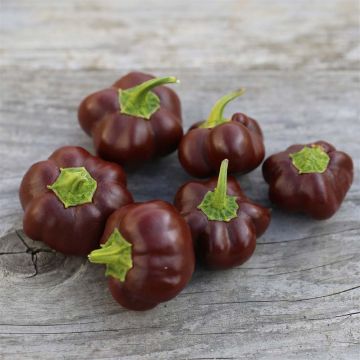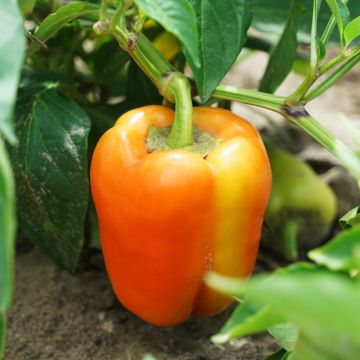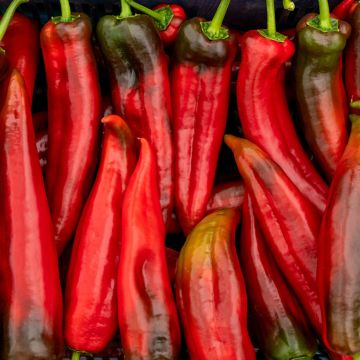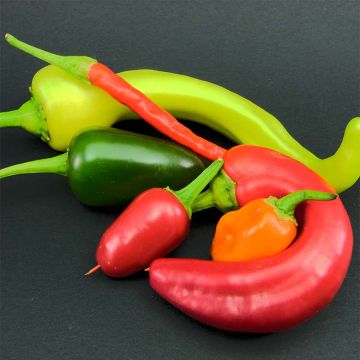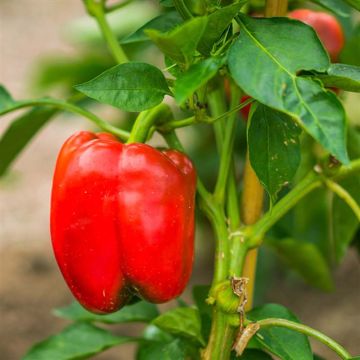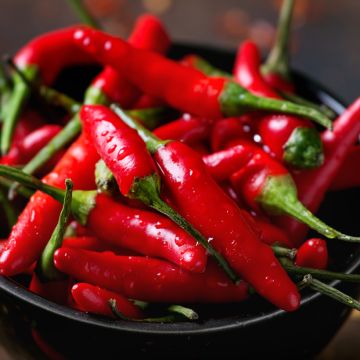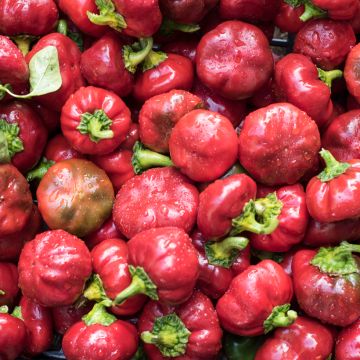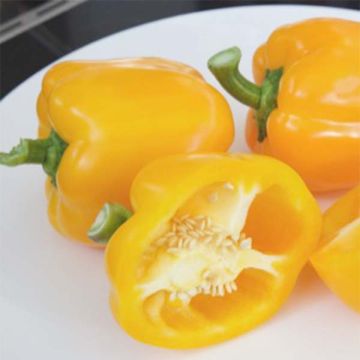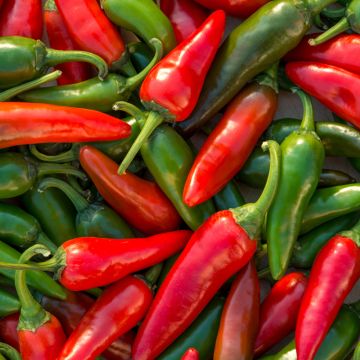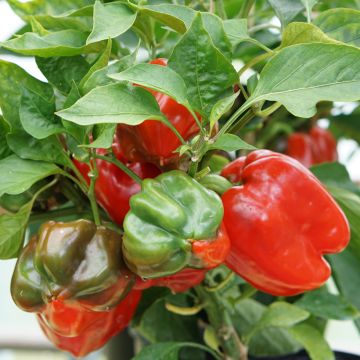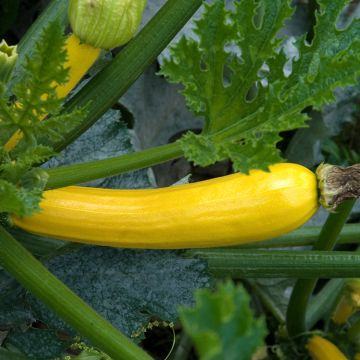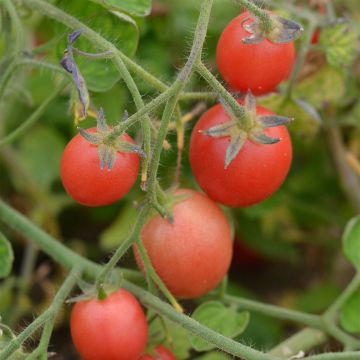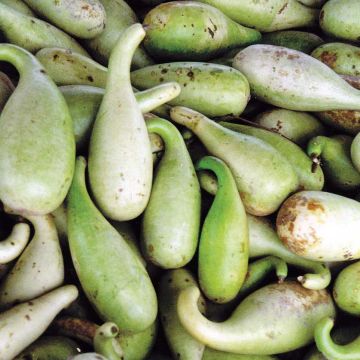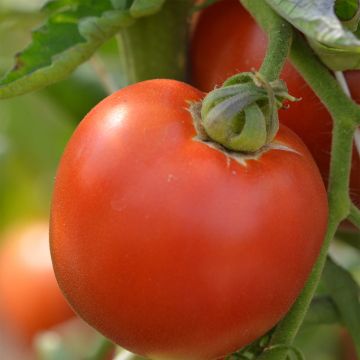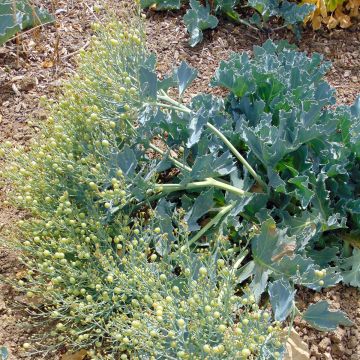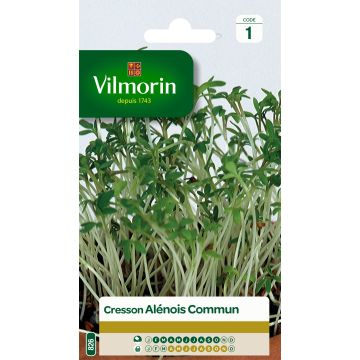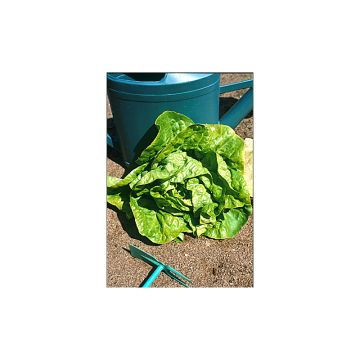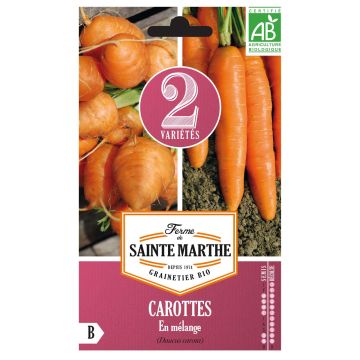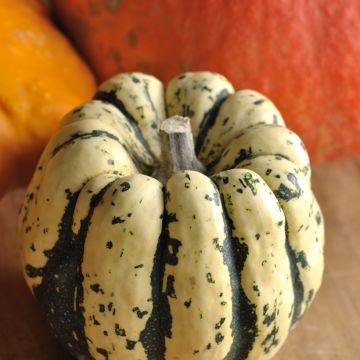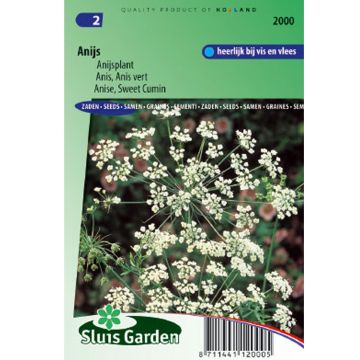

Sweet Pepper Corno di Toro Giallo - Ferme de Sainte Marthe Seeds
Sweet Pepper Corno di Toro Giallo - Ferme de Sainte Marthe Seeds
Capsicum annuum Corno di Toro Giallo
Yellow Bull's Horn
This item cannot be shipped to the selected country
Dispatch by letter from €3.90
More information
Schedule delivery date,
and select date in basket
This plant carries a 6 months recovery warranty
More information
We guarantee the quality of our plants for a full growing cycle, and will replace at our expense any plant that fails to recover under normal climatic and planting conditions.
Seed-only orders are dispatched by sealed envelope. The delivery charge for seed-only orders is €3.90.
Description
'Corno di Toro Giallo' sweet pepper is the yellow version of the classic Italian heirloom variety. This early-maturing, productive variety forms large, attractive golden yellow fruits shaped like bull's horns (approx. 20 cm long). It is one of the first varieties to ripen and is ideal for pickling. Deliciously sweet and full of flavour! Sow from February to May and harvest from July to November.
Mild-flavoured bell peppers (also known as sweet peppers) and spicy chilli peppers are all members of the Solanaceae family. They belong to the genus Capsicum that is divided into five main species: C. annuum (the most common species), C. baccatum, C. chinense, C. frutescens, and C. pubescens. Peppers are native to the Americas and were cultivated by the Incas as early as 3000 BC. They were imported to Europe by Christopher Columbus in 1493 and later spread to Asia and Africa. Capsicum plants are tropical perennials grown as annuals in cooler climates (except when grown in pots that are overwintered indoors). They produce small white or purple flowers which have different coloured anthers or seeds depending on the species. Fruits come in a variety of shapes, sizes and colours: bell-shaped, cone-shaped, elongated, square or round with red, yellow, brown, orange or purple skin and flesh when ripe (immature fruits are green).
Spiciness also varies from one variety to the next depending on the amount of capsaicin they contain. It is commonly measured on the Scoville scale in Scoville Heat Units (SHU) ranging from 0 to 10 (0 being the bell pepper). All peppers are an excellent source of vitamins and antioxidants. Bell peppers are a wonderful summer fruit, perfect eaten raw in salads, grilled on the barbecue, stuffed or made into tasty ratatouilles. Chilli peppers are used all over the world, fresh or dried, to bring a spicy tang or fieriness to dishes.
Peppers are heat-loving, heavy feeding plants that require very rich, fertile soil and plenty of sunshine. In warmer climates, Capsicum plants can be grown outdoors. Elsewhere, best results will be achieved in a greenhouse or polytunnel. Compact varieties can be grown in pots or containers on a balcony, patio or sunny windowsill. Pepper plants have an upright growth habit and often benefit from staking.
Harvesting: Time of harvest is determined by the colour of the variety when ripe as well as personal preference when it comes to heat and aroma. Pick by hand or use scissors to remove the fruits, as and when required, making sure to leave 1-2 cm of stem attached. Bear in mind that peppers continue to ripen after being picked. Some varieties of chilli are tastiest when the fruits are picked green and immature as they have a unique aroma that disappears as the fruit ripens; others can only be harvested at full maturity.
Storage: Peppers and chillies will stay fresh for several days in the refrigerator. They can also be dried, pickled or frozen for later use. When handling hot chillies, make sure to wear protective gloves to prevent the capsaicin from burning your hands (and avoid touching your eyes!).
Good to know: Capsicum plants can be grown successfully alongside tomatoes, basil or aubergines. Growing them next to radishes is an effective way to prevent red spider mite infestations. Chilli pepper tea is a powerful natural insect repellent: just boil a handful of chilli peppers in 2 to 3 litres of water and leave to macerate for a week. Wear protective gloves and glasses when spraying.
NB. Organic seeds (in French "AB" for "Agriculture Biologique") are produced from plants that aren't treated with phytosanitary products (insecticides, weed killers). The seeds do not undergo post-harvest treatment. They carry the AB label and are approved by Ecocert, an independent structure.
Report an error about the product description
Harvest
Plant habit
Foliage
Botanical data
Capsicum
annuum
Corno di Toro Giallo
Solanaceae
Yellow Bull's Horn
South America
Annual
Other Pepper seeds
Planting and care
Peppers are very easy to grow as long as they get enough sun and warmth. They will make do with most soil types although they prefer rich, loose, well-drained soil. Compact soil can be amended with sand.
Sowing under cover: from mid-February to May, sow in trays indoors, in a heated propagator or greenhouse (approx. 20°C). Bury the seeds under 5 to 7 mm of sowing mix as they need to be in the dark to germinate. Do not use compost as this may burn the future roots. Capsicum plants are fast-growing: germination takes 3-7 days on average. If the seedlings still haven't appeared after a week, don't worry: some varieties "dawdle" a bit and take their time to germinate. When the seedlings have 5 to 6 true leaves, transplant into pots to give the roots more growing space, and start to harden off the young plants by bringing them outside on sunny days.
Transplanting outdoors: once all risk of frost is cleared (generally in mid-May), the young plants can be transplanted. Choose the sunniest, warmest spot in the garden: at the foot of a South-facing wall is ideal. Loosen the soil and dig a hole that is at least 3 to 4 times the size of the pot. Add some well-rotted compost in the bottom of the hole and install the pepper plant. Bury it up to the first set of leaves. Firm the soil and create a shallow basin around the base of the plant. Water generously. Avoid getting water on the leaves to protect your plants from fungal diseases. Leave 60 cm between each plant.
Care: Mulching around your plants is a good way of maintaining soil moisture whilst limiting weed growth. Pepper plants don't need much watering as their taproot buries deep into the ground. Water thoroughly during extended dry spells. Plants grown in pots can be kept for several years as long as they are overwintered in a warm, light place. However, they won't be able to develop a taproot quite as well as in full soil and will need watering more regularly (always in moderation).
Seedlings
Care
Intended location
This item has not been reviewed yet - be the first to leave a review about it.
Vegetable seeds
Haven't found what you were looking for?
Hardiness is the lowest winter temperature a plant can endure without suffering serious damage or even dying. However, hardiness is affected by location (a sheltered area, such as a patio), protection (winter cover) and soil type (hardiness is improved by well-drained soil).

Photo Sharing Terms & Conditions
In order to encourage gardeners to interact and share their experiences, Promesse de fleurs offers various media enabling content to be uploaded onto its Site - in particular via the ‘Photo sharing’ module.
The User agrees to refrain from:
- Posting any content that is illegal, prejudicial, insulting, racist, inciteful to hatred, revisionist, contrary to public decency, that infringes on privacy or on the privacy rights of third parties, in particular the publicity rights of persons and goods, intellectual property rights, or the right to privacy.
- Submitting content on behalf of a third party;
- Impersonate the identity of a third party and/or publish any personal information about a third party;
In general, the User undertakes to refrain from any unethical behaviour.
All Content (in particular text, comments, files, images, photos, videos, creative works, etc.), which may be subject to property or intellectual property rights, image or other private rights, shall remain the property of the User, subject to the limited rights granted by the terms of the licence granted by Promesse de fleurs as stated below. Users are at liberty to publish or not to publish such Content on the Site, notably via the ‘Photo Sharing’ facility, and accept that this Content shall be made public and freely accessible, notably on the Internet.
Users further acknowledge, undertake to have ,and guarantee that they hold all necessary rights and permissions to publish such material on the Site, in particular with regard to the legislation in force pertaining to any privacy, property, intellectual property, image, or contractual rights, or rights of any other nature. By publishing such Content on the Site, Users acknowledge accepting full liability as publishers of the Content within the meaning of the law, and grant Promesse de fleurs, free of charge, an inclusive, worldwide licence for the said Content for the entire duration of its publication, including all reproduction, representation, up/downloading, displaying, performing, transmission, and storage rights.
Users also grant permission for their name to be linked to the Content and accept that this link may not always be made available.
By engaging in posting material, Users consent to their Content becoming automatically accessible on the Internet, in particular on other sites and/or blogs and/or web pages of the Promesse de fleurs site, including in particular social pages and the Promesse de fleurs catalogue.
Users may secure the removal of entrusted content free of charge by issuing a simple request via our contact form.
The flowering period indicated on our website applies to countries and regions located in USDA zone 8 (France, the United Kingdom, Ireland, the Netherlands, etc.)
It will vary according to where you live:
- In zones 9 to 10 (Italy, Spain, Greece, etc.), flowering will occur about 2 to 4 weeks earlier.
- In zones 6 to 7 (Germany, Poland, Slovenia, and lower mountainous regions), flowering will be delayed by 2 to 3 weeks.
- In zone 5 (Central Europe, Scandinavia), blooming will be delayed by 3 to 5 weeks.
In temperate climates, pruning of spring-flowering shrubs (forsythia, spireas, etc.) should be done just after flowering.
Pruning of summer-flowering shrubs (Indian Lilac, Perovskia, etc.) can be done in winter or spring.
In cold regions as well as with frost-sensitive plants, avoid pruning too early when severe frosts may still occur.
The planting period indicated on our website applies to countries and regions located in USDA zone 8 (France, United Kingdom, Ireland, Netherlands).
It will vary according to where you live:
- In Mediterranean zones (Marseille, Madrid, Milan, etc.), autumn and winter are the best planting periods.
- In continental zones (Strasbourg, Munich, Vienna, etc.), delay planting by 2 to 3 weeks in spring and bring it forward by 2 to 4 weeks in autumn.
- In mountainous regions (the Alps, Pyrenees, Carpathians, etc.), it is best to plant in late spring (May-June) or late summer (August-September).
The harvesting period indicated on our website applies to countries and regions in USDA zone 8 (France, England, Ireland, the Netherlands).
In colder areas (Scandinavia, Poland, Austria...) fruit and vegetable harvests are likely to be delayed by 3-4 weeks.
In warmer areas (Italy, Spain, Greece, etc.), harvesting will probably take place earlier, depending on weather conditions.
The sowing periods indicated on our website apply to countries and regions within USDA Zone 8 (France, UK, Ireland, Netherlands).
In colder areas (Scandinavia, Poland, Austria...), delay any outdoor sowing by 3-4 weeks, or sow under glass.
In warmer climes (Italy, Spain, Greece, etc.), bring outdoor sowing forward by a few weeks.

































